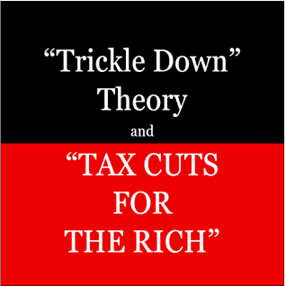Trickle Down Theory
A Derogatory term for an idea that works.
Voters must always be cautious when politicians claim someone else will cover the cost of something they intend to receive. Don’t tax us, “tax the rich” is the classic example. There is always someone with more money than I have who should cover the cost. Right? Those who believe this is not appropriate are accused of believing in something called “Trickle Down Theory.” This suggests that leaving a lot of money in the hands of the rich will result in some of it “trickling down” to those below them economically.
Thomas Sowell earned his Ph.D. in Economics at the University of Chicago. He is one of the most eloquent and prolific writers of his generation. He was so frustrated by the false label “Trickle Down Theory” that he published a small 22-page essay available as a Kindle book for $1.99 to explain why the term is a pejorative rather than a theory.
Sowell emphasizes that politicians concentrate on the next election. They strategize for that goal and don’t worry about the long-term impact of their actions. This essay is an essential review for any reader who wants to understand why cities, states, and nations are destroying their economies and seeing voluminous out-migrations of the very people they need to keep their societies growing.
I am not exaggerating. New York, Chicago, California, Great Britain, and others have created such hostile environments for wealthy people and productive activity that those who have wealth or who are interested in producing it are fleeing in impressive numbers.
In an equal-share system like tithing, every person, or family, gives the same portion of their income level. Everyone was involved. Before government taxes became steeply progressive, many individuals with greater wealth would allocate their resources in a manner that benefited the group, but they made the choice. A commercial activity employs people. A charity does that and gives aid. Hospitals, universities, libraries, museums, and orchestras have made significant contributions to society.
Sowell notes the major problem with the idea that you can continually get a lot of revenue from rich people.
You can only confiscate the wealth that exists at a given moment. You cannot confiscate future wealth - and that future wealth is less likely to be produced when people see that it is going to be confiscated.
Everyone reacts to changes that impact their ability to improve their bottom line. Families will have both adults work only if it covers the after-tax cost of childcare. The wealthy will invest their money in areas where the risk and return align.
The early classic case in American taxation occurred shortly after the passage of the Sixteenth Amendment in 1913, which created the national income tax. By 1921, the tax rates were so high that the wealthy parked their money in tax-exempt state and local bonds. Even though the returns were low, the after-tax revenue was better. Thomas Mellon served as Treasury Secretary under Harding, Coolidge, and Hoover. He oversaw three laws reducing tax rates and increasing tax revenues. People were willing to invest more and even pay more in taxes if they got more for themselves as a result.
John F. Kennedy understood this history. When he came into the Presidency in 1961, the top marginal rate was 90%. He lowered the rate and triggered an expansion. Ronald Reagan did the same thing. In both cases, revenues increased. Deficits didn’t necessarily decrease. Congress can spend more than it gets, but revenue did increase.
Donald Trump followed the same idea. He understands what clogs an economy or opens it up. The key is the attitude of government leaders towards those who have the resources and take the risks needed to keep an economy dynamic. As the Twenty-first century began, envy and cowardice reigned in America, Canada, and Europe.
Nations, as well as American cities and states, had decided that the wealthy were appropriate sources of revenue. They also convinced the public that by taxing corporations, they could raise money without causing any harm to individuals. Reality was biting. Cities like Chicago and Los Angeles were losing upper-class and middle-class people. The same thing was happening in many “blue states” like California and New York.
NATO countries, especially Britain, are seeing a massive exodus of the wealthy and the productive. Educated young people left as soon as possible, seeking a place where they could retain a reasonable portion of their income. Because some of these countries have many lower-income, lower-skilled immigrants, population loss is not apparent. But the tax base and productive capacity are pretty different.
Once the wealthy and productive are gone, growth stops. These are the people who take risks and invest in ideas, stores, factories, machines, and everything else that adds to the wealth of a society. Drive them away and, as Sowell said, “future wealth is less likely to be produced.”

